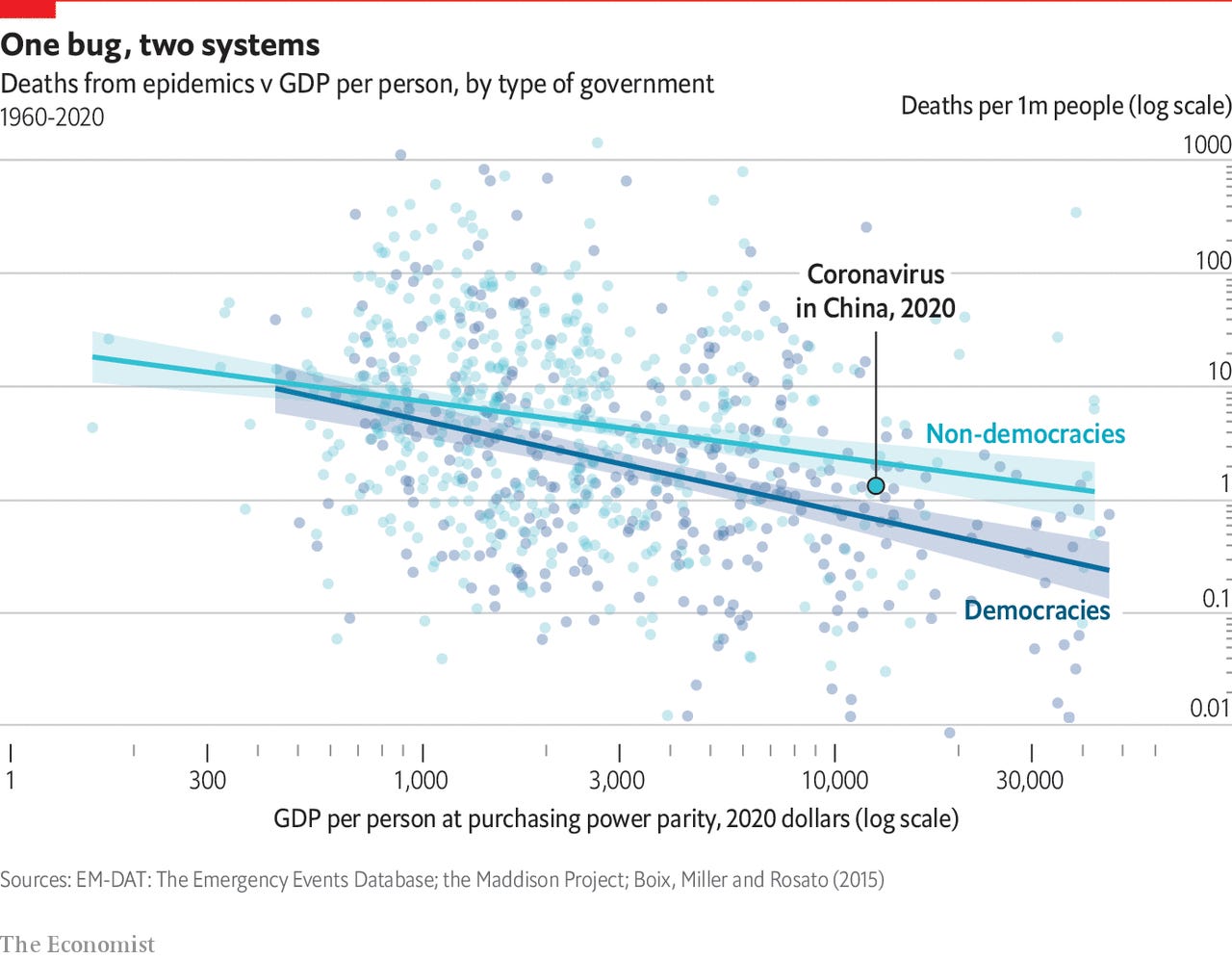An anonymous reader muses upon the following question, and asks that I do so as well:
“This pandemic also brings out a clear cut difference between an authoritarian state and democratic state. For Authoritarian states, it is much easier to control the pandemic for they have surveillance over every movement of their citizens, which can’t be in a democratic state
So, this might also lead to states assuming more power and control after the pandemic gets over”
First things first, let me tease out two separate aspects of this question:
- Is there a case to be made for a state to be authoritarian while tackling the crisis?
- If the answer to the first question is in the affirmative, might it be likely that said authority will want to remain in power after the crisis is over?
Let’s consider the evidence at hand in terms of authoritarian governments being better at tackling the crisis:
Danielle Pletka, writing in The Dispatch, begins and continues her essay arguing against the idea that authoritarian regimes will do a better job in these times:
Dictatorships make you sick. Not spiritually, not morally (though both may apply), but actually sick. Consider the responses to coronavirus by China and Iran, two authoritarian regimes whose rank mismanagement and compulsion to cover-up have driven the world to a full-blown pandemic.
She also shows this figure:

and quotes from The Economist:
Using data from the International Disaster Database, maintained by researchers at the Catholic University of Louvain in Belgium, we analysed all recorded epidemics since 1960, from an outbreak of smallpox in Nepal in 1963 to more recent threats such as Zika and Ebola. The results were highly dispersed but a distinct trend was apparent: for any given level of income, democracies appear to experience lower mortality rates for epidemic diseases than their non-democratic counterparts (see chart). In authoritarian countries with China’s level of income, for example, we found that past epidemics have killed about six people per 1m population. In democracies with similar incomes, they have killed just four per 1m.
The key takeaway is this:
Authoritarian regimes are much more likely to be concerned with their image, and with keeping bad news down, because that is important to the perpetuation of said regimes. A media clampdown, in fact, is all but guaranteed if you are in an authoritarian regime. And I hope I don’t speak for myself when I say that is the last thing one could want.
We cannot fully test the counterfactual and know whether conversely regime support would have further eroded under restrictive media policy. However, our matching (quasi)-experiment strongly suggests that the authorities failed to reap obvious benefits from this strategy. Indeed, later restrictions on access to and reporting from the epicenter and the arrest of several activists seem to confirm our finding that the benefits of openness and transparency are tenuous at best. For better of worse, media control is key ingredient of authoritarian resilience.
The Atlantic argues that public trust, transparency and collaboration are key at such times:
Yet good public-health practice doesn’t just require control. It also requires transparency, public trust, and collaboration—habits of mind that allow free societies to better respond to pandemics. Democracies’ ability to cope with COVID-19 will soon be tested; after a proliferation of cases in South Korea, Japan, and Italy in recent days, officials are weighing how to respond. But citizens of democratic nations can reasonably expect a higher level of candor and accountability from their governments.
For these reasons, I find myself arguing against the idea that an authoritarian government will necessarily be better.
In addition, it is worth noting that Taiwan and South Korea – to the best of my knowledge the countries that have dealt with the crisis the best – are anything but authoritarian regimes today.
A better way to think about this issue is to ask if a country has the state capacity. Read this article by Gulzar Natarajan, and this review of In the Service of the Republic by me (preferably the entire book) to get a better idea about state capacity.
Now, the second question:
If the answer to the first question is in the affirmative, might it be likely that said authority will want to remain in power after the crisis is over?
Hungary has already succumbed:
On Monday, Hungary’s parliament passed a controversial bill that gave Orban sweeping emergency powers for an indefinite period of time. Parliament is closed, future elections were called off, existing laws can be suspended and the prime minister is now entitled to rule by decree. Opposition lawmakers had tried to set a time limit on the legislation but failed. Orban’s commanding two-thirds parliamentary majority made his new powers a fait accompli.
And this Twitter thread makes for depressing reading:
Might some leaders, and some citizens (from countries the world over) wish for a more authoritarian regime in the hope that the corona virus is better tackled than at present?
Perhaps.
But it will almost certainly make a bad situation worse, and the regime will almost certainly outlive the crisis.
And so, to me, it is an unreservedly bad idea.
To be clear, I know for a fact that the anonymous reader does not want such a regime: they simply wanted to air the question – and so, dear anonymous reader, thank you for helping make my thinking about this clearer than it was before!
